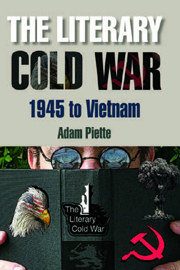Book contents
- Frontmatter
- Contents
- Acknowledgements
- Introduction
- 1 The Special Relationship and the British Hypothesis: The Black Laurel, The Third Man, Cold War Vienna and Berlin
- 2 Cold War on the 1930s and Sacrificial Naming: John Dos Passos and Josephine Herbst
- 3 DEW Line, Uranium and the Arctic Cold War: Ginsberg's Kaddish and Nabokov's Lolita
- 4 Cold War Sex War, Or the Other Being Inside: Burroughs, Paley, Plath, Hughes
- 5 The Sacrificial Logic of the Asian Cold War: Greene's The Quiet American and McCarthy's The Seventeenth Degree
- Conclusion
- Bibliography
- Index
5 - The Sacrificial Logic of the Asian Cold War: Greene's The Quiet American and McCarthy's The Seventeenth Degree
Published online by Cambridge University Press: 12 September 2012
- Frontmatter
- Contents
- Acknowledgements
- Introduction
- 1 The Special Relationship and the British Hypothesis: The Black Laurel, The Third Man, Cold War Vienna and Berlin
- 2 Cold War on the 1930s and Sacrificial Naming: John Dos Passos and Josephine Herbst
- 3 DEW Line, Uranium and the Arctic Cold War: Ginsberg's Kaddish and Nabokov's Lolita
- 4 Cold War Sex War, Or the Other Being Inside: Burroughs, Paley, Plath, Hughes
- 5 The Sacrificial Logic of the Asian Cold War: Greene's The Quiet American and McCarthy's The Seventeenth Degree
- Conclusion
- Bibliography
- Index
Summary
Graham Greene's The Quiet American has often been praised for its prescience about American involvement in Indochina, less for its analysis of the British view of the American superpower in imperial mode. The novel cleverly updates the love triangle of The Third Man to establish this, underlining Greene's interest in the Cold War as a story about the manner in which the United States opts to take over global responsibilities from the old colonial powers. The shift in scene from war-scarred Europe in The Third Man to the Communist-insurgent Third World in The Quiet American acknowledges the new fact about the Cold War in the early 1950s: that its true battleground was no longer Europe and the captive city but the old colonial possessions of the European nation states.
For Greene, it is the combination of US ‘innocent’ propaganda with counterinsurgent dirty tricks which is of interest in helping define the precise terms of American assumption of responsibility for colonial wars, and how far that intervention is indebted to the example of other colonial/anti-Communist police operations, in particular the example of British handling of the Malayan Emergency. American counterinsurgency and propaganda in Vietnam were in many ways fashioned according to the successful formulae developed by the British in Malaya. What Greene's allegory sanctions, however, is the suspicion that France and Britain (according to the dictates of the paranoid conspiratorial fantasy generated by the Cold War) may have cunningly caught the US up into colonial conflicts by preaching the Cold War necessities of counterinsurgency, only to abandon America to its fate in the quagmire of an unwinnable war.
- Type
- Chapter
- Information
- The Literary Cold War 1945 to Vietnam , pp. 152 - 208Publisher: Edinburgh University PressPrint publication year: 2009



